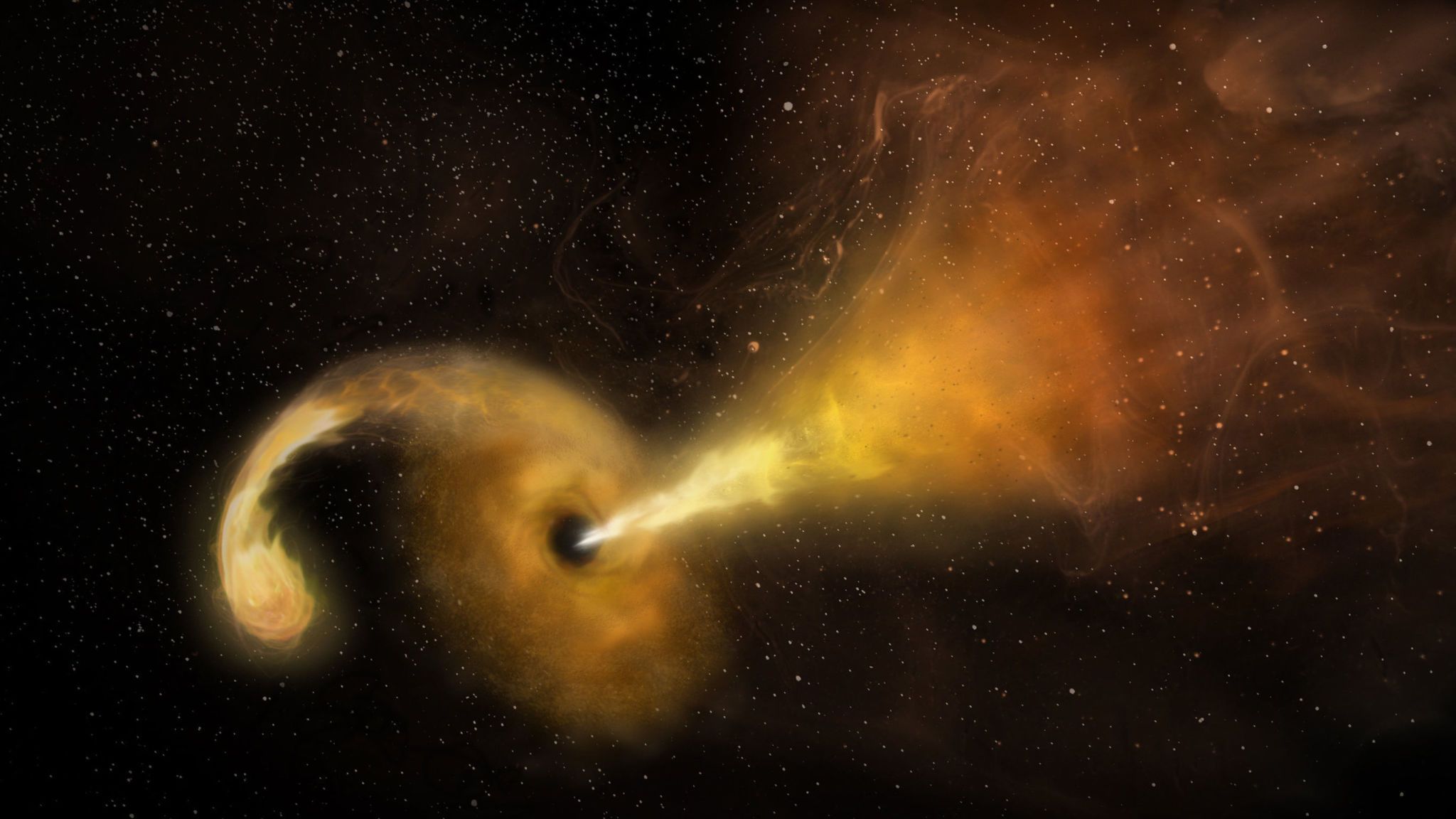Scientists see black hole eating star for first time
Astronomers surprised by event that could lead to greater understanding of astrophysics

A free daily email with the biggest news stories of the day – and the best features from TheWeek.com
You are now subscribed
Your newsletter sign-up was successful
Using advanced telescopes focused on a pair of colliding galaxies nearly 150 million light-years from Earth, astronomers have for the first time watched as a star was “eaten” by a black hole.
It was seen “gobbling a star twice the size of the Sun”, says Sky News, and then ejecting a “rapid jet of particles”. The star had drifted into the gravitational field of the black hole, which is itself 20 million times bigger than the Sun.
Only a small number of stellar deaths, called tidal disruption events (TDEs) have been detected and none has been witnessed, “although scientists have hypothesised that they may be a more common occurrence”, says Phys.org.
The Week
Escape your echo chamber. Get the facts behind the news, plus analysis from multiple perspectives.

Sign up for The Week's Free Newsletters
From our morning news briefing to a weekly Good News Newsletter, get the best of The Week delivered directly to your inbox.
From our morning news briefing to a weekly Good News Newsletter, get the best of The Week delivered directly to your inbox.
Theoretical astrophysicists “believe that material pulled from the doomed stars forms a rotating disk around the black hole, emitting intense radiation and shoots powerful jets of material from the poles of the disk, close to the speed of light”, says Sky News.
Seppo Mattila of the University of Turku in Finland and Miguel Perez-Torres of the Astrophysical Institute of Andalusia in Spain led a team of 36 scientists from 26 institutions around the world in the observations of the galaxies, between them known as Arp 299.
The scientists said the discovery of the TDE was particularly surprising.
"Never before have we been able to directly observe the formation and evolution of a jet from one of these events," said Perez-Torres.
A free daily email with the biggest news stories of the day – and the best features from TheWeek.com
Most galaxies have supermassive black holes, “which can pull matter into them and form a huge disc around their outsides as they do”, says The Independent.
“Much of the time, however, supermassive black holes are not actively devouring anything, so they are in a quiet state,” Perez-Torres said. “Tidal disruption events can provide us with a unique opportunity to advance our understanding of the formation and evolution of jets in the vicinities of these powerful objects.”
Mattila now hopes that other insights will follow. “By looking for these events with infrared and radio telescopes, we may be able to discover many more, and learn from them,” he said.
-
 The ‘ravenous’ demand for Cornish minerals
The ‘ravenous’ demand for Cornish mineralsUnder the Radar Growing need for critical minerals to power tech has intensified ‘appetite’ for lithium, which could be a ‘huge boon’ for local economy
-
 Why are election experts taking Trump’s midterm threats seriously?
Why are election experts taking Trump’s midterm threats seriously?IN THE SPOTLIGHT As the president muses about polling place deployments and a centralized electoral system aimed at one-party control, lawmakers are taking this administration at its word
-
 ‘Restaurateurs have become millionaires’
‘Restaurateurs have become millionaires’Instant Opinion Opinion, comment and editorials of the day
-
 Epstein files topple law CEO, roil UK government
Epstein files topple law CEO, roil UK governmentSpeed Read Peter Mandelson, Britain’s former ambassador to the US, is caught up in the scandal
-
 Iran and US prepare to meet after skirmishes
Iran and US prepare to meet after skirmishesSpeed Read The incident comes amid heightened tensions in the Middle East
-
 Israel retrieves final hostage’s body from Gaza
Israel retrieves final hostage’s body from GazaSpeed Read The 24-year-old police officer was killed during the initial Hamas attack
-
 China’s Xi targets top general in growing purge
China’s Xi targets top general in growing purgeSpeed Read Zhang Youxia is being investigated over ‘grave violations’ of the law
-
 Panama and Canada are negotiating over a crucial copper mine
Panama and Canada are negotiating over a crucial copper mineIn the Spotlight Panama is set to make a final decision on the mine this summer
-
 Why Greenland’s natural resources are nearly impossible to mine
Why Greenland’s natural resources are nearly impossible to mineThe Explainer The country’s natural landscape makes the task extremely difficult
-
 Iran cuts internet as protests escalate
Iran cuts internet as protests escalateSpeed Reada Government buildings across the country have been set on fire
-
 US nabs ‘shadow’ tanker claimed by Russia
US nabs ‘shadow’ tanker claimed by RussiaSpeed Read The ship was one of two vessels seized by the US military